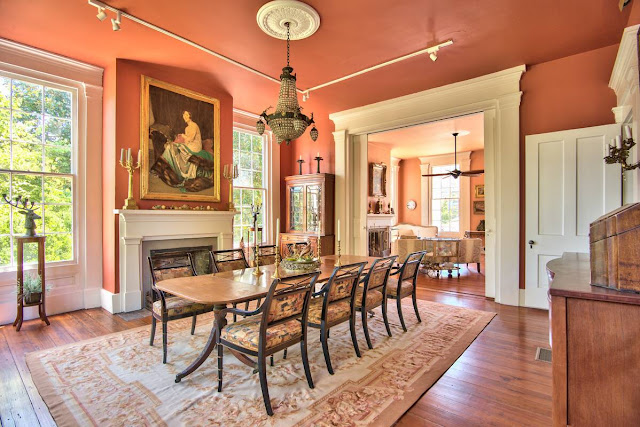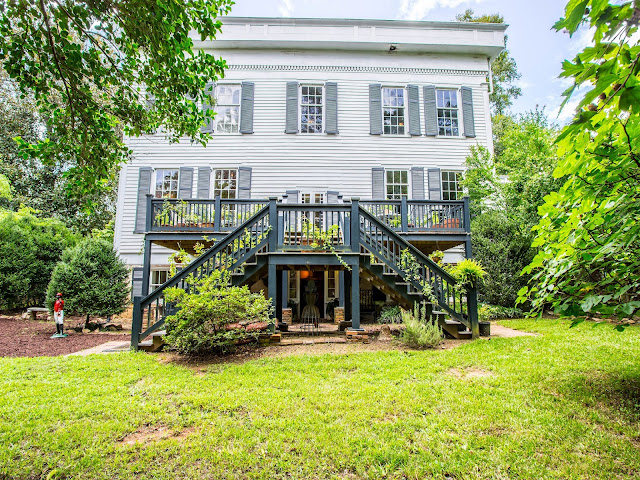This grand, majestic Greek Revival known as “Panola Hall” with huge Doric columns lining its porch and a large second floor balcony overlooking splendid grounds of gardenias, camellias, magnolias, azaleas, hydrangeas, heirloom petunias, rhododendron and multitudes of other southern period plantings that fill the air with a fragrance known only in The South, was home to the well known Dr. Benjamin Hunt. (1847-1934)
A former New York banker, Benjamin Hunt became known for his contributions to the dairy industry and livestock improvement in Putnam County and middle Georgia. Also recognized for horticultural experimentation and animal husbandry, Hunt had a lasting impact on the Georgia Piedmont.
Benjamin Weeks Hunt was born in 1847, the youngest child of Mary Quinby and Benjamin Hunt, prosperous New York Quakers. He was educated at Mount Kisco Academy in New York. Trained in business, Hunt then worked for a large financial house. In 1876, shortly after his marriage to Louise Prudden, a poet and member of a prominent Eatonton, Georgia, family, Hunt decided to make his home in Putnam County.
Upon moving to Eatonton, Hunt brought the first registered Jersey cows to Georgia. Unfortunately, half of this original herd died from splenic fever. Also called tick, Southern, and Texas fever, the disease caused the value and production abilities of cattle to drop by as much as 40 percent. Believing the Piedmont region’s climate to be ideal for livestock, Hunt began to investigate causes of and cures for the disease. Hunt was the first to immunize cattle successfully against the fever. Furthermore, he organized Putnam County’s Anti-Tick Association and lobbied, against strong opposition, for a state tick eradication law.
In his effort to improve livestock Hunt also investigated the cause of bovine osteoporosis. After collaborating with veterinarians at the University of Kentucky, Hunt determined that a dietary insufficiency in the region’s alluvial soil was the culprit and could be adjusted for by treating animals with supplements of phosphate of lime and adequate sunshine. Hunt freely shared his discoveries with local farmers and in agricultural journals.
Hunt was a friend of Louis Pasteur’s, the French scientist who invented the process of pasteurization and developed a vaccine for rabies. When a rabid cat bit Hunt in 1898, he immediately traveled to the Pasteur Institute in France for treatment. After receiving double dosages of the rabies vaccination in half the time of the normal procedure, Hunt recovered and returned home determined to establish such an institute in Georgia. Established in 1901, the Pasteur Institute in Atlanta provided all Georgians with access to Pasteur’s rabies treatment. The institute operated independently until 1908, when it was taken over by the state’s health department.
Hunt also was the force behind the first cotton mill in Eatonton, the Eatonton Public Library and the Middle Georgia Railroad. The railroad connected Covington to Eatonton and provided the means for Putnam County to export its dairy products quickly to more urban areas. He drew on his financial experience to help establish the Middle Georgia Bank, which was the first lender to make loans against agricultural commodities other than cotton.
Hunt received national recognition as a horticulturist and served as an assistant to the U.S. Department of Agriculture by receiving exotic plants to observe. Originator of the “Hunt fig,” a hearty hybrid that could withstand the Georgia winters, Hunt encouraged farmers to grow a variety of fruits that could be sold in the North. Hunt’s contributions won him admiration and gratitude. In 1922 he received an honorary doctorate from the University of Georgia. He died at his home in Eatonton in 1934 and is buried in Pine Grove Cemetery there.
Built by James M. Broadfield in 1854 for Henry Trippe, the home boast over 6,000 square feet including the lower of three levels, all of which have gracious wide center halls running front to back.
Dr. Hunt , a native New Yorker, acquired “Panola Hall” in 1891 after his marriage to Louisa Prudden, member of a prominent Eatonton Georgia family. A former New York banker, Benjamin Hunt became known for his contributions to the dairy industry and livestock improvement in Putnam County and middle Georgia. Also recognized for horticultural experimentation and animal husbandry, Hunt had a lasting impact on the Georgia Piedmont. He was awarded an honorary degree from the University of Georgia.

































































No comments:
Post a Comment